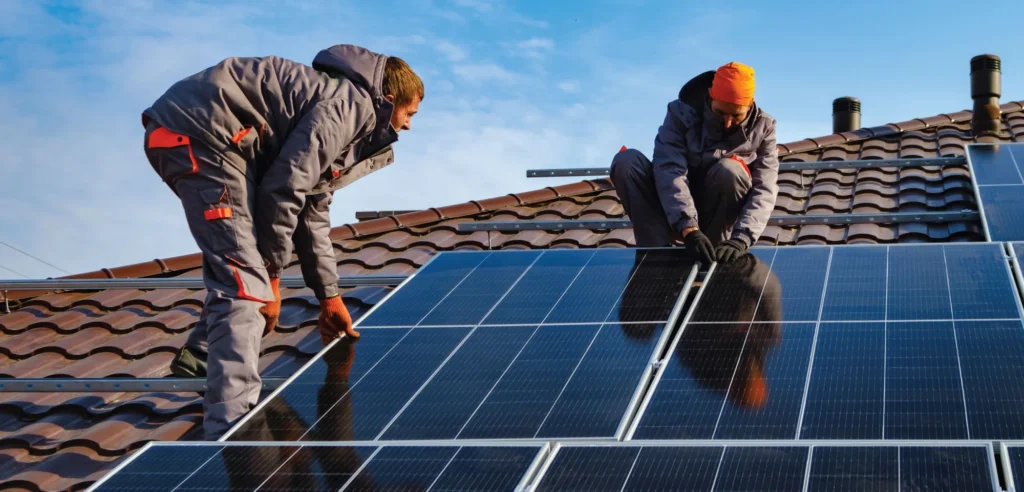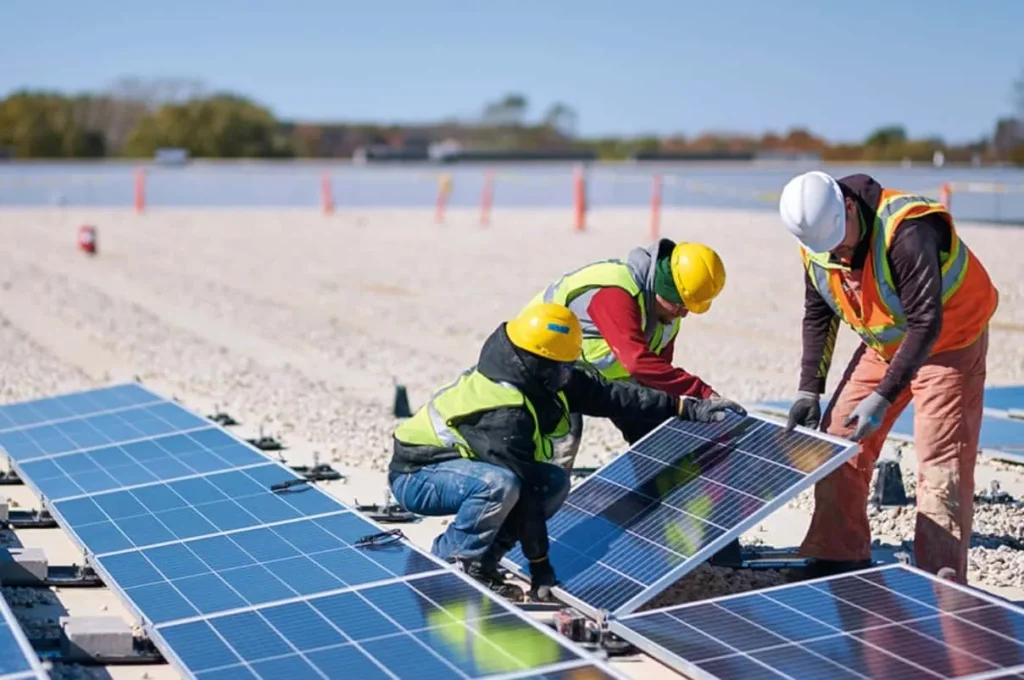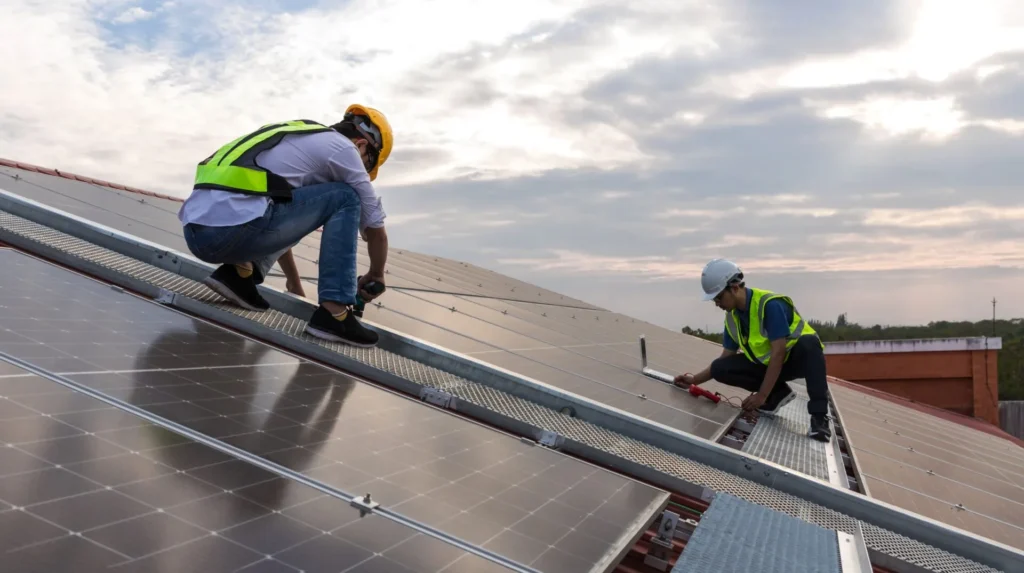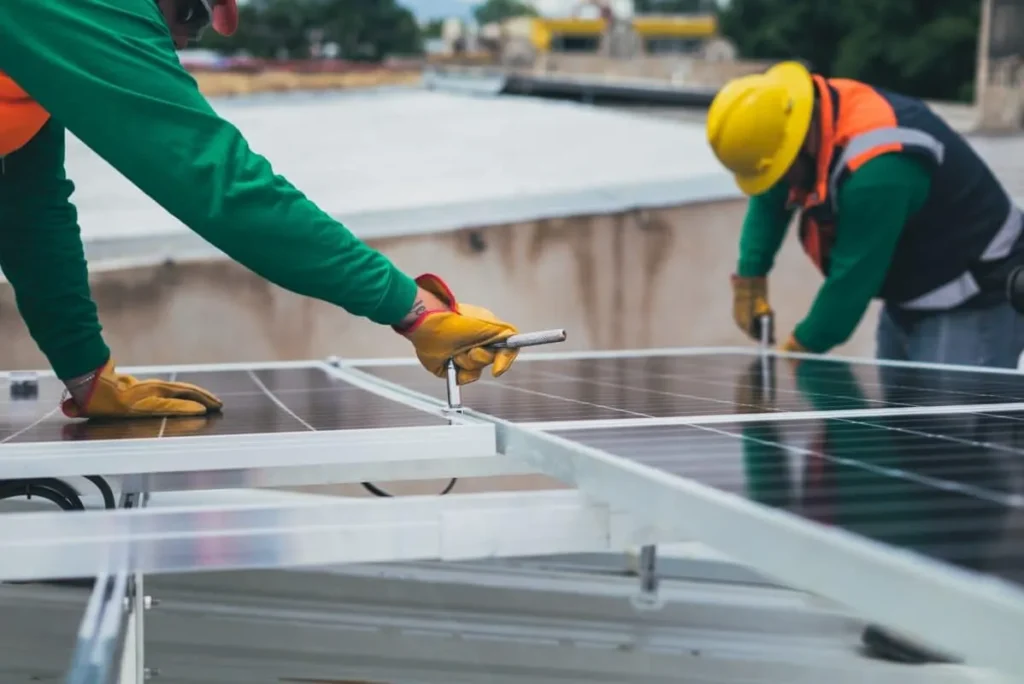Introduction
Freelancing as a Solar Panel Installer in the UAE is a timely, high-potential opportunity. With national targets for clean energy, municipal rooftop programmes and utility net-metering initiatives, demand for qualified Solar Panel Installer professionals is strong across Dubai, Abu Dhabi and the Northern Emirates.
This guide gives a practical, up-to-date (2025) roadmap for setting up as a licensed Solar Panel Installer and consultant: what licences you need, mandatory certifications, how to enrol with utilities (DEWA/AD authorities), commercial essentials such as insurance and VAT, and marketing and pricing tips to win projects. Whether you want to work solo on residential roofs or consult on commercial PV projects, this article helps you avoid common compliance traps and build a professional freelance practice.

1. ? What a freelance Solar Panel Installer does (scope)
A freelance Solar Panel Installer typically performs site surveys, system design (or works with a designer), procurement advice, physical installation of modules and inverters, on-site testing and commissioning, and assists clients with utility interconnection and net-metering paperwork. As a consultant, you can also handle feasibility studies, ROI modelling, and energy audits. Many successful freelancers mix hands-on installation with consultancy to increase margins and reduce downtime between jobs.
2. ? Legal structures & licences you must consider (mainland vs free zone)
To carry out paid work in the UAE, you must operate under an approved legal structure. Common options for a Solar Panel Installer freelancer include:
- Freelance permit from a free zone (e.g., Dubai Development Authority, Expo City Dubai, or other free zones offering freelancer packages). These permits let you invoice clients and often include visa options.
- Mainland trade licence (Department of Economy & Tourism in Dubai or equivalent in other emirates) under a renewable-energy activity code — required if you want to be a registered contractor/consultant and issue DEWA/utility invoices directly. DEWA lists specific activity codes for “Renewable Energy Consultancy” and “Solar Energy System Installation.”
- Sub-contracting under an existing company — a lower-friction route where a registered contractor hires you as an independent sub-contractor while they hold the solar trade licence.
If your ambition is to install systems and apply for solar permits on behalf of customers, you will need the contractor/consultant trade activity on your licence and to enrol with the relevant utility (see Section 4). For many freelancers, starting with a recognised free-zone freelance permit is simpler; scale to a mainland renewable trade licence once you have a steady pipeline and intend to sign contracts directly.
3. ? Mandatory training & certification (DEWA Solar PV Expert)
Utilities and building authorities require certified personnel for PV work. In Dubai, the DEWA Solar PV Expert certification is central: DEWA runs a training and examination that issues junior or senior PV expert certificates; DEWA-enrolled consultants/contractors must nominate certified PV experts on their teams to be eligible for solar permits. If you plan to operate as a Solar Panel Installer and apply for connections or NOCs, obtaining the DEWA PV Expert certificate is essential.
Abu Dhabi and other emirates have their own technical guidance and inspection requirements (e.g., Abu Dhabi DoE technical guidance on PV installations). For commercial work, you may also need accredited electrical contractor experience and an electrical wiring licence. Always check the emirate-specific technical guidance before accepting a job.
4. ? Utility enrolment & net-metering (Shams Dubai, grid connection)
If you will submit solar permit applications and final commissioning paperwork, you must enroll as a consultant/contractor with the local utility. In Dubai, the Shams Dubai (DEWA) net-metering programme and the DEWA contractor/consultant enrolment process let eligible firms and certified experts apply for PV connections, obtain Solar NOCs, and request grid export meter configurations. Knowing the enrolment rules (minimum certified staff, activity codes, and document requirements) is essential before marketing yourself as a Solar Panel Installer who can “connect” customers.
Key takeaway: Do not promise customers a grid connection until you or your principal contractor is enrolled with the utility and can submit the technical drawings and test certificates the utility demands.
5. ? Step-by-step set up checklist for a freelance Solar Panel Installer (practical)
Below is a practical checklist that most Solar Panel Installer freelancers follow to start taking paid jobs in the UAE:
- Choose legal route: freelance permit or mainland trade licence.
- Obtain DEWA/utility PV certification (DEWA Solar PV Expert) and any electrical contractor certificates.
- If needed, enrol with the utility as a Solar PV Consultant/Contractor (DEWA enrollment).
- Open a business bank account (required for invoicing).
- Buy essential tools & PPE (scaffold/harnesses, multimeter, clamp meter, insulation testers).
- Get professional indemnity & public liability insurance (see Section 7).
- Draft standard contracts and warranty paperwork for clients.
- Establish supplier relationships for panels, inverters, and mounting hardware.
- Price your services and set payment terms (deposit, milestone payments).
- List your services and start marketing to property managers, developers, and homeowners.
Repeat: being a certified Solar Panel Installer is one part — being licensed, insured, and enrolled with utilities is what lets you legally sign off on installations and claim grid connections.

6. ? Insurance, contracts & warranties every Solar Panel Installer must have
Insurance and clear written contracts protect both you and the client. As a Solar Panel Installer freelancer, you should carry:
- Public liability insurance (covers third-party injury/damage).
- Professional indemnity insurance (covers design/consultancy mistakes).
- Employer’s liability (if you hire labour).
- Product warranties and workmanship warranties — specify duration and exclusions in your contract.
Include a clear scope of work, payment schedule, site access rules, and a clause handling variations (hidden roof issues, structural strengthening). A Solar Panel Installer who lacks insurance or a robust contract risks high exposure if a system causes damage or underperforms.
7. ⚖️ VAT, invoicing & taxes for freelancers (UAE specifics)
The UAE has a value-added tax (VAT) regime. If your taxable supplies exceed the mandatory registration threshold (check the current threshold for 2025), you must register for VAT and issue compliant invoices. Even as a small Solar Panel Installer freelancer, adopting VAT-ready invoicing and maintaining accounting records simplifies dealings with clients and suppliers. For contractor work, suppliers and construction customers often request VAT invoices — factor this into your pricing and cashflow model. (For current VAT thresholds and filing rules, consult the Federal Tax Authority.)
8. ?️ Tools, suppliers & technical best practice every installer should follow
A competent Solar Panel Installer must use quality materials and follow manufacturer installation guides and emirate technical standards. Best practices include:
- Correct roof penetrations and waterproofing details.
- Proper stringing/array layout to avoid shading and mismatch.
- Electrical compliance: earthing, DC/AC isolation, appropriate fuse sizing, and cable derating for UAE temperatures.
- Load calculation for inverters and careful selection of module mounting systems rated for local wind loads.
Work according to DEWA/DoE technical specs and the equipment manufacturers’ instructions; poor installations are the main source of warranty claims and reputational risk for any Solar Panel Installer.
9. ? Market, pricing & how to win customers (sales playbook)
The UAE market segments for a Solar Panel Installer are residential rooftops, commercial solar for warehouses and office blocks, and small utility or community projects. To win work:
- Build local partnerships with building management companies and property developers.
- Offer free site surveys and a clear ROI presentation (payback, lifetime savings, incentives).
- Provide transparent pricing: equipment cost, installation, commissioning, and permit fees (utilities may charge admin fees).
- Highlight certifications (DEWA PV Expert) and insurance on proposals — customers prefer certified Solar Panel Installer professionals.
Tip: offer maintenance contracts after installation (cleaning, performance checks) — recurring revenue is valuable for freelancers.
10. ? Scaling from solo Solar Panel Installer to a small contracting firm
Many successful freelancers scale by:
- Building a team of certified PV experts (so the firm meets the “staff certification” requirement when enrolling with utilities).
- Upgrading their trade licence to a contractor licence (renewables).
- Adding a project manager/quantity surveyor to handle commercial bids.
- Investing in branded safety equipment and a small vehicle fleet.
- Submitting for DEWA/utility enrollment as a contractor so the firm can sign off on connections and invoices.
If you plan to scale, plan the transition: hiring certified staff, upgrading licences, and formal supplier agreements will make your offering credible to larger clients and utilities.

Conclusion
The UAE market presents an attractive runway for a freelance Solar Panel Installer who combines technical competence with the right licences, insurance, and utility enrolments. Start small with a freelance permit or by sub-contracting, obtain DEWA/PV certification early, and plan to scale by hiring certified staff and upgrading your licence when demand grows. By following utility enrolment rules (DEWA/DoE), adhering to technical standards, and using proper contracts and insurance, a Solar Panel Installer freelancer can build a trusted, growing business in Dubai, Abu Dhabi, and beyond. The energy transition creates recurring opportunities — maintenance, monitoring, and advisory services are growth areas where a skilled Solar Panel Installer can earn premium fees.
If you’d like, I can: produce a printable one-page checklist for client site visits, draft a sample contract for Solar Panel Installer services, or pull together a starter supplier list for panels and inverters in the UAE.
External links & resources (official/authoritative)
- DEWA — Shams Dubai & Solar community resources (net-metering, enrolment).
- DEWA — Enroll as DRRG Solar PV Consultant/Contractor (activity codes, staff certification).
- DEWA — Solar PV Certification Training (DEWA Solar PV Expert course details).
- Abu Dhabi Department of Energy — Solar PV installation guidance document (technical guidance).
- Dubai Development Authority — Freelancer / Sole Professional Licence (free-zone freelance permit information).
- ICLG — Renewable Energy Laws and Regulations (UAE, 2025) (legal & policy update).
Also Read: Freelance Plumbers: How to Promote Your Services Online — A Modern, Practical Guide(2025)


2 thoughts on “Solar Panel Installer — Thriving as a Freelance Solar Panel Installer & Consultant in the UAE (2025 Success Guide)”